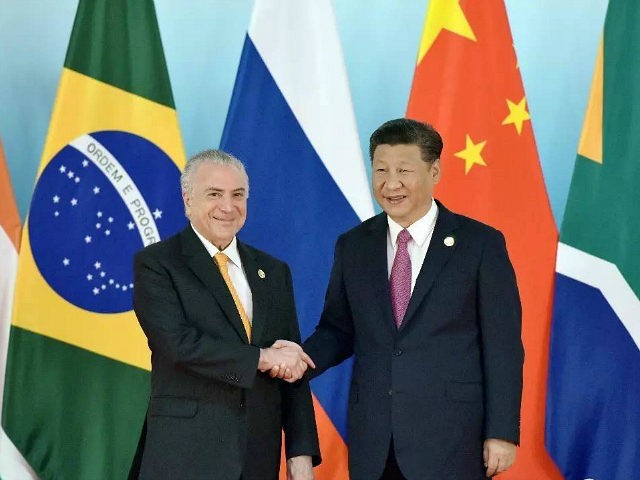WASHINGTON, DC — Foreign Minister of Brazil Ernesto Araujo claimed on Wednesday his country has “benefitted a lot from trade with China,” apparently diverging from conservative President Jair Bolsonaro’s warnings against business with the communist regime as a presidential candidate last year.
During an event sponsored by the conservative Heritage Foundation, Amb. Ernesto Araujo acknowledged that “Brazil has benefitted a lot from trade with China,” adding:
We do have the feeling that in the past, Brazil didn’t negotiate well with China, we didn’t use well our cards well and again [that is] no fault of China. It’s the fault of our negotiators.
…
I don’t see, at all, any sort of adversarial relationship with China. I think it’s also a cooperative relationship that can come with mutual benefits.
Bolsonaro, who reportedly invited the Chinese communist regime to send an envoy to his inauguration on January 1 after calling for a global coalition against communism, is expected to visit Beijing later this year.
As a presidential candidate, the Brazilian leader warned against Chinese investment. Echoing the rhetoric and policies of President Donald Trump, Bolsonaro repeatedly cautioned about Beijing’s growing influence on his country.
Respectively, China and its rival the United States are Brazil’s top two trading partners. Both China and the United States have boasted about their relationship with the Bolsonaro government in Brazil.
The South American country is the second-largest democracy and economy in the Americas after the United States.
Araujo conceded that Brazil’s economy had taken a hit, blaming “China’s competitiveness.”
He added:
We’re trying to also address those imbalances … Our coming visit to China is part is part of our efforts to address that — to have more access to Chinese markets and sectors [where we are not present].
He contended that Beijing benefited most than any other country from globalization, and that has created some “imbalances” between China and the United States.
“It’s not, I think, China’s fault, but it’s a problem for some people, I guess, in the U.S.,” he continued, referring to the trade war between the two countries.
In June, the White House said the American President Donald Trump and Bolsonaro discussed the threat China poses to the Western Hemisphere during the G20 summit. However, China gloated soon after Bolsonaro took office that the South American president is determined to improve Brazil’s ties with Beijing.
The U.S. military has repeatedly warned against Beijing’s growing presence and influence in Latin America. According to the U.S. military, China is rapidly expanding its Belt and Road Initiative (BRI) in the Western Hemisphere. BRI is a massive infrastructure and digital network project that is expected to link China to the rest of the world. U.S. officials have warned that China is using BRI as a predatory lending vehicle used to undermine borrowing countries’sovereignty by burying them in unsustainable loans.
China often requires natural resources and other strategic assets as collateral for the loans.
In February, U.S. Southern Command (SOUTHCOM) — charged with overseeing most of Latin America and the Caribbean — warned:
China has accelerated expansion of its Belt and Road Initiative [in the region] at a pace that may one day overshadow its expansion in Southeast Asia and Africa. … China utilizes the same predatory, non-transparent foreign lending practices it has implemented around the world to exert political and economic leverage in certain countries. China has pledged at least $150 billion in loans to countries in the hemisphere, and 16 nations now participate in the Belt and Road Initiative.
Brazil has reportedly signed on to BRI, which the United States considers a threat.
Before Bolsonaro’s election, some observers acknowledged that South American leader would have to enhance its relationship with China to revive Brazil’s economy.

COMMENTS
Please let us know if you're having issues with commenting.